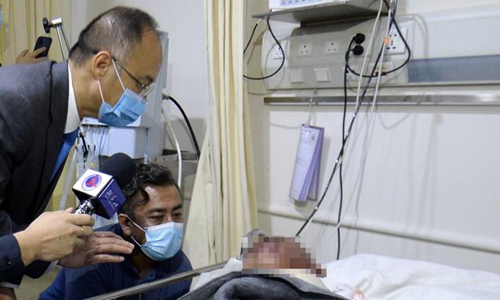Pakistani politician pointed to terrorist attack as cause of the deadly bus blast

Photo:Xinhua
A Pakistan official said investigation suggests there are traces of explosives at the scene of the deadly bus blast that killed nine Chinese nationals in Khyber Pakhtunkhwa province, making him the first Pakistani public official to indicate a terrorist attack.
China is also set to send a cross-department work group to aid Pakistan on the case on Thursday, Zhao Lijian, spokesperson of China’s Foreign Ministry, announced on Thursday. Chinese analysts said as long as this case remains unsolved, nothing can be ruled out.
Fawad Ahmed Chaudhry, Pakistan’s federal minister for information and broadcasting, tweeted on Thursday night, “Initial investigations into the Dassu [Dasu] incident have now confirmed traces of explosives. Terrorism cannot be ruled out, and the PM is personally supervising all developments. In this regard, the government is in close coordination with the Chinese embassy, and we are committed to fighting the menace of terrorism together.”
Nine Chinese nationals and three Pakistanis were killed when a commuting bus exploded in northern Pakistan on Wednesday morning on its way to the China-invested Dasu hydropower project.
Hours after the incident, the Chinese Embassy in Pakistan issued a statement, referring to the accident as an “attack.”
Zhao said at a Wednesday briefing that China was shocked and condemned the bomb attack in Khyber Pakhtunkhwa province. Hours later, the Pakistani foreign ministry issued a statement, calling the incident an accident caused by a mechanical failure, resulting in a gas leak which triggered the explosion.
After the incident, several Chinese diplomats, including China’s State Councilor and Foreign Minister Wang Yi, urged Pakistan to thoroughly investigate into this matter.
During a meeting with Pakistani Foreign Minister Shah Mahmood Qureshi on Wednesday, Wang Yi urged Pakistan to investigate the blast and said that if it was indeed a “terrorist attack,” Pakistan should immediately arrest the culprits and punish them severely.
On Wednesday night, Chinese Ambassador to Pakistan Nong Rong visited the injured in the hospital. Nong also urged that the truth of the incident be found, and he called for severe punishment for anyone responsible.
When asked about the cause of the accident, Zhao said on Thursday that an investigation is still under way, and that China will work closely with Pakistan to find out what had happened.
Li Wei, an expert on national security and counter-terrorism at the China Institutes of Contemporary International Relations, told the Global Times on Wednesday that Chinese projects are well protected by the Pakistani army and police, and vehicles carrying Chinese employees are usually followed and led by Pakistani military vehicles, especially in sensitive regions such as Khyber Pakhtunkhwa province.
If it were a roadside bomb, Pakistani guard vehicles would have been the first targets, Li said. He noted that if it were a motorcycle attack, it would have been easy to identify, as there would be a wrecked motorcycle on site.
“Since there is no information on that, such a possibility could be ruled out,” he said.
Yet some other South Asia watchers are leaning toward the possibility of terrorist attacks. If it turned out to be a terrorist attack, Balochistan terrorists and the Pakistani Taliban are possible sponsors of the bomb attack, Qian Feng, director of the research department at the National Strategy Institute at Tsinghua University, told the Global Times.
Qian said the Pakistani Taliban gained fame by attacking the Pakistani government, civilians and army. In recent years, the terrorist group has targeted Chinese projects in this country, and launched attacks on Chinese tourists, as well as businesspeople, as they know that Pakistan attaches great importance to China-Pakistan ties and they aim to use those attacks to sabotage the bilateral relations, said Qian.
The Pakistani Taliban’s activities have been subdued during the Pakistani government’s continuous efforts against terrorism, yet they have been on the rise recently in the aftermath of the US withdrawal from Afghanistan, Qian pointed out.
Mainstream and social media in Pakistan also paid close attention to the bus explosion and some believe it was a terrorist attack and an attempt to drive a wedge between China and Pakistan and undermine the progress of infrastructure construction in Pakistan.
While the security situation in Pakistan has been improving and the number of violent attacks has been decreasing, there has been an increasing trend of attacks against Chinese targets in the past two years, Wang Shida, deputy director of the South Asia, Southeast Asia and Oceania Research Institute of Contemporary International Relations Research Academy of China, told the Global Times.
According to Zhao, Pakistan has sent its condolences via different channels, promised to treat the injured and ensure the safety of Chinese nationals as well as Chinese projects in Pakistan.
Experts reached by the Global Times believe that this incident won’t change China-Pakistan cooperation, although the investigation may take some time but they believe that high-level of trust between the two countries will produce a truthful, reliable and convincing result.

